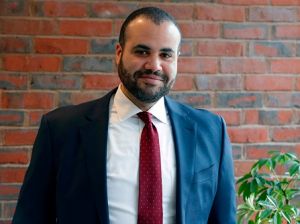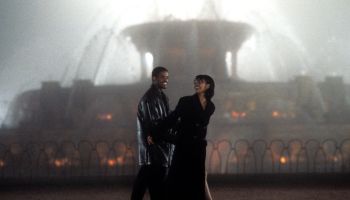Man Says FBI Pressured Him To Recent Racial Profiling Claim

Johnathan Perkins, an attorney in the office of General Counsel at Harvard University
RICHMOND, Va. (AP) — A young law student’s story of being racially profiled by campus police at the University of Virginia in 2011 drew outrage in Charlottesville, a liberal college enclave that boasts of its inclusiveness.
When he recanted weeks later, he was branded a liar and an example of what’s wrong with affirmative action. One editorial writer called him a “race hoax hustler.”
Seven years later, Johnathan Perkins wants to set the record straight, at a time when racial profiling by police is very much part of the social consciousness in the wake of the Black Lives Matter movement. Perkins now says an FBI agent pressured him to say he made up a story about two white officers harassing him because he is black.
“I want people to know what actually happened. I want people to know that people of color don’t have to make these things up,” Perkins told The Associated Press in a recent interview.
Now a lawyer at Harvard University, Perkins said he is no longer afraid of repercussions for making an allegation of racial profiling nor worried authorities could bring charges against him. A statute of limitations for a charge of making a false statement expired in 2016.
Perkins has been invited to the University of Virginia this fall to speak to the Black Law Students Association about his experience, an event Perkins said will bring him full circle from the days in 2011 when he feared his dream of becoming a lawyer would be snatched away because of the brief encounter with police.
Perkins said the officers stopped him April 1, 2011, as he walked home from a diner after a party.
The officers told him he “fit the description” of someone they were looking for. They searched him and pushed him against their cruiser, Perkins said. When he asked for names and badge numbers, they said, “‘You don’t need to worry about that,'” according to Perkins.
Perkins said he was shaken and unsure what to do. One of his professors, Kim Forde-Mazrui, suggested Perkins report the stop to police and write a letter to the editor of the law school newspaper.
In the letter to the Virginia Law Weekly, Perkins said he wanted to share the story “because it is important for my classmates to hear a real-life anecdote illustrating the myth of equal protection under the law.”
After it was published, Perkins received an outpouring of support from students and local residents. Two university police lieutenants told him they were investigating the incident.
The next month, Perkins received a call from FBI agent Robert Hilland. Accompanied by the campus police lieutenants, Hilland interviewed Perkins in a small conference room at the law school. Perkins said he quickly sensed the investigation was focused on him, not the officers.
“He said something to the effect of, if the FBI got involved, he would release the hounds. He was holding the dogs back now, he was going to release them, there would be FBI agents all over campus talking to my friends,” Perkins said.
Hilland also referred to a job Perkins had accepted, and Perkins said Hilland told him he “couldn’t promise that the FBI wouldn’t visit my law firm.”
Hilland, who is still with the FBI and lists himself as a supervisory special agent on his LinkedIn profile, did not respond to an email.
A spokeswoman for the FBI in Richmond declined a request to speak with Hilland and referred questions to the University of Virginia police department.
University officials and campus police declined requests for comment.
Perkins said he dreaded the thought of the FBI questioning his family, friends and employer.
“At some point, I just gave in to him and said, ‘OK, what do you need me to sign to say it didn’t happen?'” Perkins said.
The next morning, the university issued a statement saying Perkins had recanted. It didn’t mention the FBI.
The statement said university police reviewed dispatch records, personnel records, police radio tapes and other materials, but were unable to corroborate his allegation.
The backlash was immediate. Newspaper columnists slammed him, his job offer in Philadelphia was rescinded and Perkins was charged by the university’s Honor Committee with lying, which meant he could be kicked out of law school. Eventually, though, he was acquitted.
Law school classmate Laurel Sakai said Perkins had told her about being stopped by campus police and was with him the day Hilland called him.
After speaking with Hilland, Perkins “seemed a little bit in shock,” she said. “He said, ‘I didn’t want to put everyone through that, so I recanted.’ He just seemed not to understand the consequences,” Sakai recalled.
He tried to put the episode behind him, but his damaged reputation haunted him.
Last year, after getting a job as an attorney in Harvard’s Office of the General Counsel, Perkins began to feel emboldened, both by the support he received from colleagues and the passage of time.
“And in the climate we’re seeing now — particularly with the rise of the Black Lives Matter movement — I couldn’t live with myself if I didn’t speak the truth about what actually happened.”
READ MORE STORIES ON BLACKAMERICAWEB.COM:
- Nicki Minaj Blasts SZA, Punch And TDE In Latest X Rant
- Tamar Braxton & Gilead Partner For PrEP Promo To Black Women
- Love Island USA Season 7 Finale: Amaya and Bryan Crowned Champions
GET THE HOTTEST STORIES STRAIGHT TO YOUR INBOX:
(AP Photo/Stephan Savoia)















